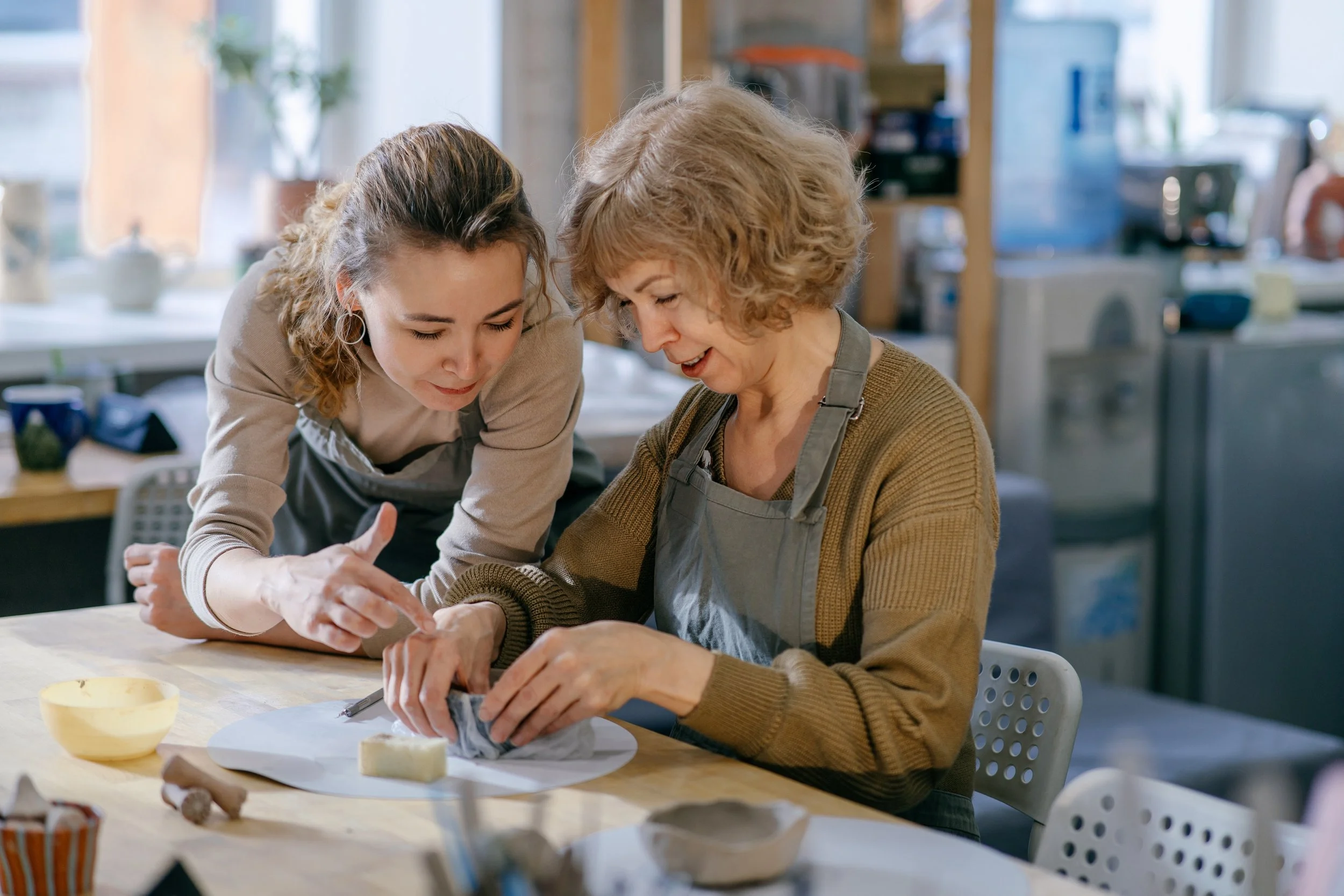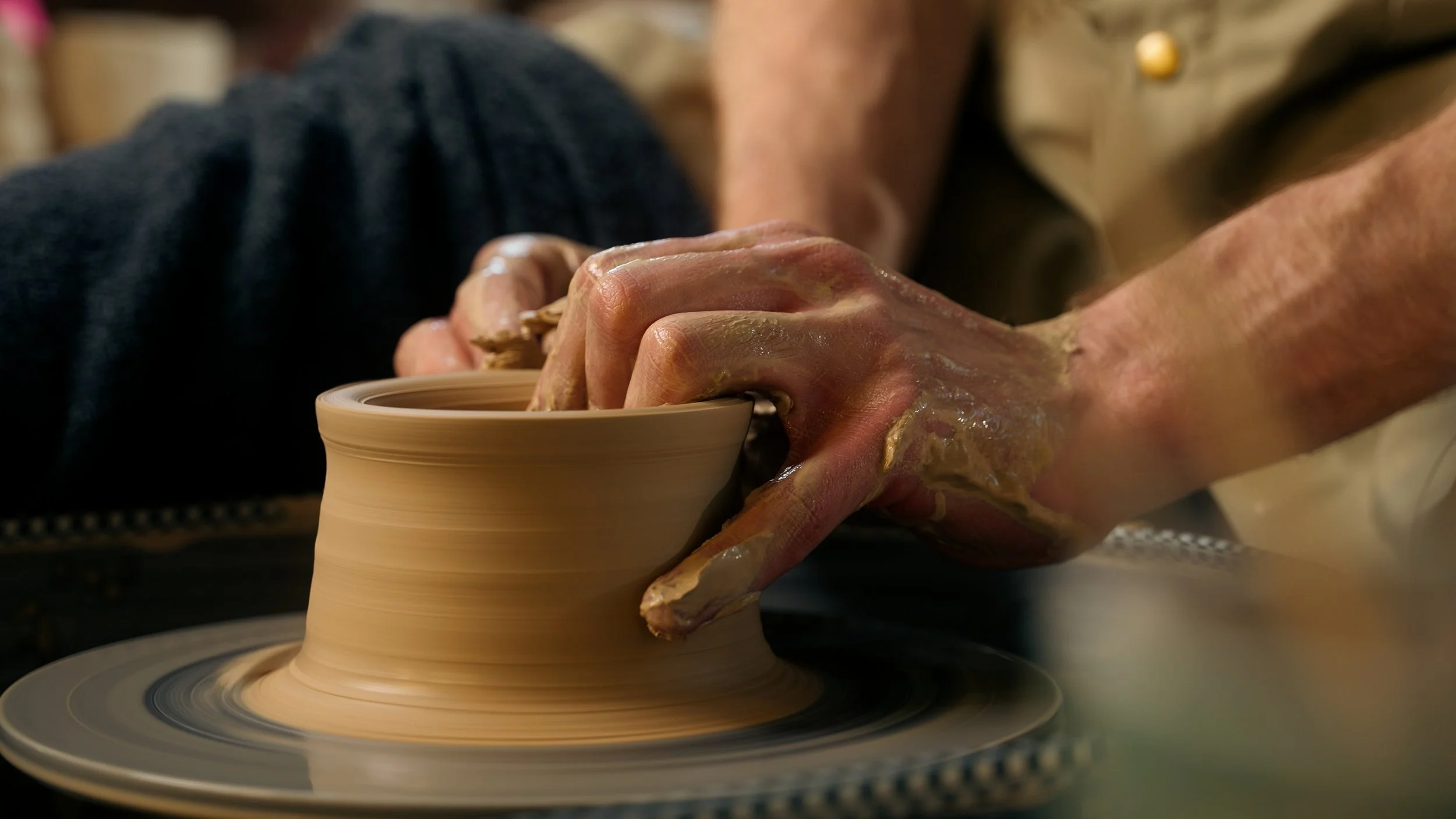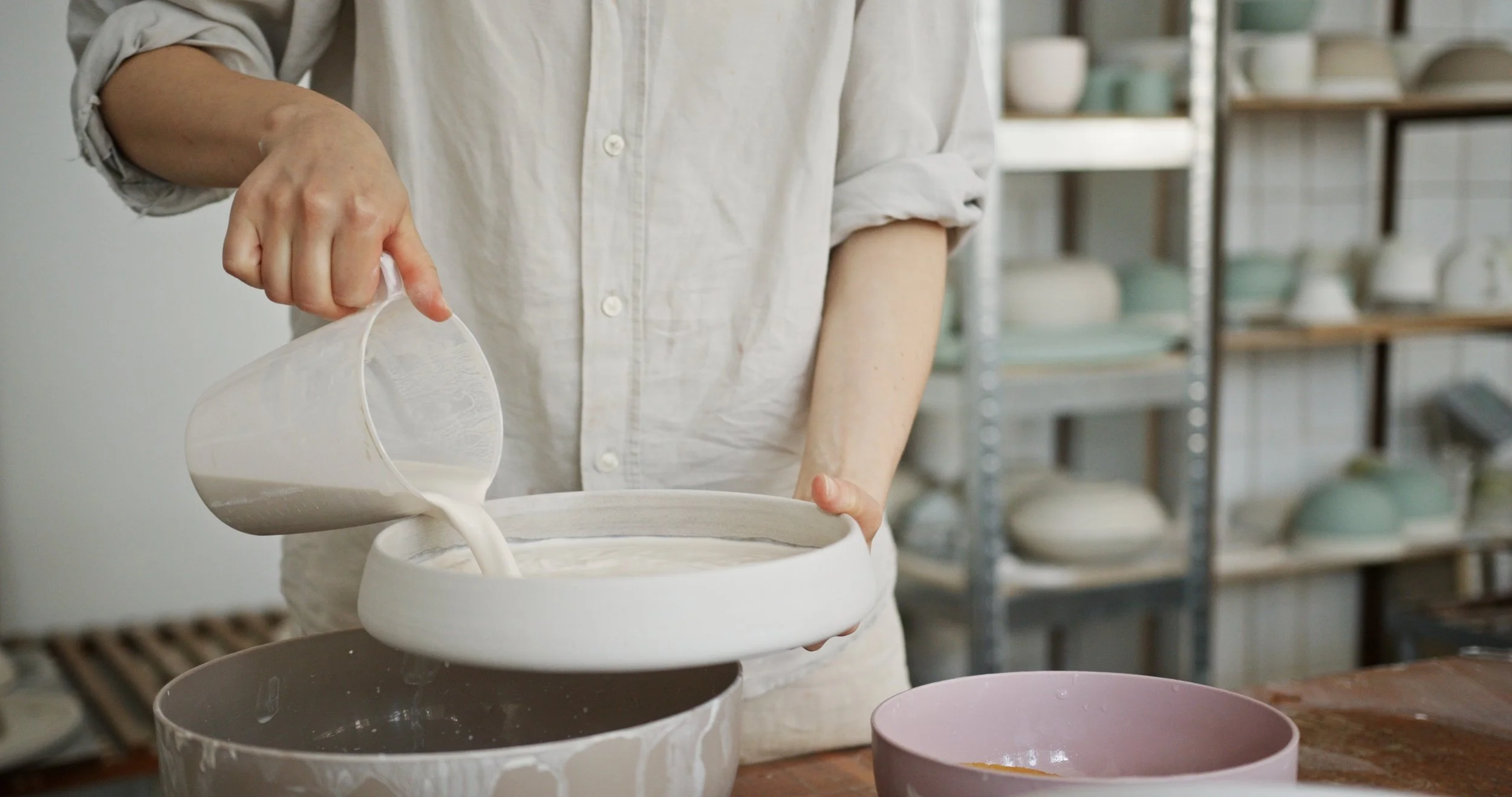
Bayan Studio Safety & Health Protocols
Our studio is a shared space, and safety is a shared commitment. These protocols are designed to keep the entire Bayan Studio community safe and healthy while working with clay and glazes. The single most important rule is 'Wet Clean Everything. Never Sweep.'
This section outlines the required cleanup procedures, personal protective equipment (PPE), and operational rules necessary to mitigate the risks associated with silica dust and ensure a healthy environment for everyone working across our 7,500 sq ft space.
All students and members will go through training before they may use the studio and must sign the studio policies and procedures handbook. These guidelines are non-negotiable and apply to everyone using the studio space.
-

Core Safety, Personal Hygiene & Conduct
Equipment: Do not use any large equipment (pugmill, slab roller) until you have received formal training and authorization from a staff member.
No Eating or Drinking in Work Areas: Food and drinks, especially open containers, are strictly prohibited in the immediate work areas (wheels, glazing, kiln rooms) to prevent accidental ingestion of clay or glaze chemicals.
Aprons and Shoes: Wear an apron or smock to protect clothing. Closed-toe shoes are mandatory at all times to protect feet from tools, sharp clay, and broken ceramics.
Hand Washing: Wash hands thoroughly with soap and water after handling clay and glazes, and before eating, drinking, or leaving the studio.
Do Not Touch Others' Work: Respect the work of others. Do not touch, move, or remove the plastic from anyone else's in-progress pieces.
-

Studio Security & Access
Authorized Entry: The Bayan Studio operates using a secure, keyless entry system. Your assigned access code is for your personal use only and must never be shared with unauthorized individuals.
Unknown Visitors: Do not let in anyone who is not an actively enrolled student, current member, or Bayan Studio staff.
If you notice someone entering the studio without being accompanied by an authorized student or member, or if you suspect unauthorized entry, you must notify Bayan staff members immediately.
Maintaining the security of our shared 7,500 sq ft space is a collective responsibility to protect everyone's work and equipment.
Accident Reporting: Report all accidents, injuries, or broken equipment immediately to a staff member.
No Unattended Children or Pets: Maintain a professional and safe working environment.
-

Security System & Late Night Access
Bayan Studio is committed to your personal safety, especially since you may be spending extended hours in our 7,500 sq ft facility.
Studio Security: Our building is protected by a comprehensive security system that operates 24/7.
Cameras continuously monitor the front entrance, back entrance, and the general studio floor.
This security system is directly connected to the local police department and fire department for rapid emergency response.
Protocol for Overnight Use: If you plan to be at the studio after 11:00 PM or before 6:00 AM, you must notify a Bayan Studio staff member in advance. This essential step ensures we can account for your safety in the event of an alarm or emergency.
-

Respiratory Safety & Ventilation (Dust & Fumes)
No Sweeping or Dry Sanding: ABSOLUTELY PROHIBITED. Sweeping or dusting stirs up silica dust, which is respirable and poses a major health risk (silicosis).
Wet Cleaning: All work surfaces, wheels, floors, and shelves must be cleaned using wet sponges and a wet mop to keep all clay particles contained and prevent them from becoming airborne.
Dedicated Kiln Ventilation: Our kilns have a dedicated kiln ventilation system that exhausts all firing fumes (carbon monoxide, sulfur compounds, etc.) directly to the outside.
PPE for Dry Materials: Anyone working with dry clay or glaze chemicals (mixing, weighing, or reclaiming bone-dry clay) must wear a properly fitted NIOSH-approved respirator/dust mask (e.g., N95 or better).
Wet Sanding Only: Trimming greenware (dry clay) should be done while it is still damp (leather-hard). If pieces must be smoothed later, they must be wet-sanded over a bucket of water or sink, never dry-sanded inside the studio.
-

Kiln and Glaze Safety
Glazing Area Rules: Wear gloves when handling dry glaze materials or liquid glazes that contain hazardous chemicals. Ensure glazes are wiped completely off the bottom ("dry footed") of pieces to prevent them from sticking to the kiln shelves.
Glaze Disposal: Any glaze that cannot be poured back in its designated container must be disposed of in the glaze disposal bucket. It should not be poured in the sink. Use a wet sponge to clean off glaze.
Kiln Access: Only studio staff should operate the kilns.
Kiln Room Protocol: The kiln room must be kept clear of clutter and flammable materials. A clear space of at least 12-18 inches around the kilns is recommended.
High-Fire Clay: Enforce a strict policy that all clay fired in your high-fire kilns must be purchased from the studio or be a known clay body approved by staff to ensure it fires to the correct cone and prevents damage (melting) to the kiln shelves.
-

Daily Mandatory Cleanup Checklist
All Bayan members and students must complete the following steps before leaving the studio.
Clay Trimming/Scraps: Scrape all wet clay, trimmings, and slop from your wheel, splash pan, and table. Place all scraps in the designated Reclaim Buckets (separated by clay body).
Wheel & Work Surface: Wet-sponge the entire wheel, splash pan, and surrounding pedestal. Wipe down your work table surface. Do this multiple times to remove all visible film.
Tools & Bats: Thoroughly wash all personal tools and studio bats (do not leave a powdery film). Return all cleaned studio tools and communal bats to their proper storage locations.
Floor Area: Wet-mop the floor around your wheel and table. DO NOT SWEEP. Sweeping stirs up silica dust. Use a wet sponge to pick up any remaining bits.
Sink & Water: Scrape all large clay sediment from your cleaning water buckets and the sink trap/screen. NEVER pour heavy slop down the drain. Wipe down the entire sink area.
Personal Storage: Ensure all greenware is correctly labeled and placed neatly on your assigned shelf. Nothing should be left on communal tables or floors.
Glaze Area (If Used): Wipe down the glazing counter and clean brushes in the dedicated wash area. Ensure no glaze is left to dry on surfaces.
